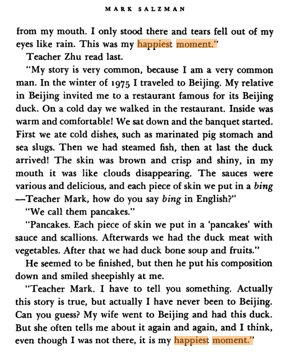Speaking of Lydia Davis, here’s another of her short stories that I really like:
This is a beautifully constructed story with matryoshka-like nesting of several accounts: first, Davis writing this story; second, of the account written down by the English teacher; third, of the story told by his student; forth, of the experience by the student’s wife; which turns into Davis’ favorite story. And then there’s the nice parallelism of the word “hesitate.”
Turns out this story is based on a section (p.58) in Mark Salzman’s book “Iron and Silk” in which he writes about his experiences as an English teacher in China in the 1980s.
(Someone once compared Davis to the Velvet Underground, saying that, although their first LP sold only a few thousand copies, everybody who bought one went out and started a band. (e.g. Jonathan Franzen, David Foster Wallace, Dave Eggers, etc.))


 There’s been some good discussion over at
There’s been some good discussion over at 
 Mario Gomez is a baffling footballer. There is a short story co-written by Jorge Luís Borges and Adolfo Bioy Casares called “Esse est percipi”, in which the authors imagine that the Argentinian football that supposedly drew huge crowds in the 1930s didn’t really happen. Instead, it was cleverly scripted and performed by a radio commentator. The matches were simply fabrications. Likewise, there are some players who — upon viewing them — perform so radically different than their reputations that it makes fans wonder whether their careers were made up. And Mario Gomez was always one of them.
Mario Gomez is a baffling footballer. There is a short story co-written by Jorge Luís Borges and Adolfo Bioy Casares called “Esse est percipi”, in which the authors imagine that the Argentinian football that supposedly drew huge crowds in the 1930s didn’t really happen. Instead, it was cleverly scripted and performed by a radio commentator. The matches were simply fabrications. Likewise, there are some players who — upon viewing them — perform so radically different than their reputations that it makes fans wonder whether their careers were made up. And Mario Gomez was always one of them.